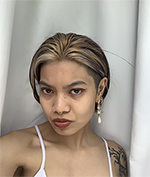 Plenitude Magazine Managing Editor Patrick Grace talks with the summer issue #219 contributor about imbuing pop culture references in poems, the body as a conveyor of language, and punctuation as an instruction for breathing.
Plenitude Magazine Managing Editor Patrick Grace talks with the summer issue #219 contributor about imbuing pop culture references in poems, the body as a conveyor of language, and punctuation as an instruction for breathing.
PG: When reading your poetry, I'm struck by a dreamy and domestic lilt, whether it be the comfort of friends and music in "all my friends in a room listening to say it right by nelly furtado," or the sweet haze of late summer in "killing flies in late september." Is this theme common in your writing?
LL: Oh, yes. When I think of tenderness and domesticity in poetry, I think of Adrienne Rich’s Twenty-One Love Poems, and “Poem II," where she says: “I hesitate / and wake. You've kissed my hair / to wake me. I dreamed you were a poem, / I say, a poem I wanted to show someone..." But it’s bittersweet, because she’s writing about someone impossible for her to show, or to love openly, in the world that they live in. She has to dream up somewhere different to make up for that lack. A poem can be like that—a landscape you invent in which love is always possible. Sometimes I think that’s where my impulse to write comes from, that desire for someplace habitable. Houses for all the tenderness I can't express aloud.
Read the rest of Louie Leyson's interview as well as a full poem.
Martha Nell Cooley, issue #219 fiction contributor
 Fiction Editorial Board intern Nevada Alde talks with the summer issue #219 contributor about auto-fiction, becoming more of an anti-racist person, and writing during the early months of the pandemic..
Fiction Editorial Board intern Nevada Alde talks with the summer issue #219 contributor about auto-fiction, becoming more of an anti-racist person, and writing during the early months of the pandemic..
NA: Writing can often challenge us in a number of ways. What would you say has been your biggest writing challenge, whether personal (ex. trying reach a large goal) or professional (ex. pushing through writer’s block to meet a deadline)? On the other hand, what has been your greatest success.
MNC: One thing I’ve been trying to do is to write about whiteness in a way that feels authentic and relevant. I don’t want to write from the lens of default whiteness. I want the ethnicities of my characters to be acknowledged because it’s a huge part of how people are in the world, but I’ve also struggled to figure out how to do that. And I realize my writing about race as a white person will only ever be as thoughtful as I am, so it’s more of an internal struggle to become more of an anti-racist person in order to write about race in a way that doesn’t do harm.
In this piece I’m writing from the perspective of a white person, which is acknowledged so that it’s not assumed, and then I’m also trying to include characters with other identities and acknowledge them as well. And I don’t know why it feels so hard to do that. Oh, wait I do. It’s because of centuries of racism. Anyway, I haven’t figured any of this out, I just wanted to say that that’s a central challenge that I’m engaging with. And it feels both terrifying and essential.
Read the rest of Martha Nell Cooley's interview.